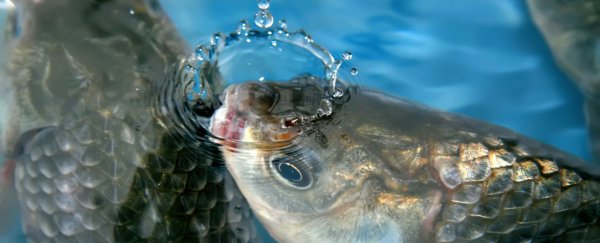Every winter, the northern European crucian carp gets frozen into the ice, and receives no oxygen. Every spring, when the ice melts, a seeming miracle occurs: the fish emerges from the ice and resumes normal life.
Or, not quite. When they thaw from their winter freeze, the crucian carp's brain is not quite the same, according to new research. But the same researchers also found that the fish can recover from its months of anoxia.
The mechanism whereby the fish stays alive has been relatively well studied. It relies on glycogen stored in the body, producing ethanol via glycolysis. Their hearts can remain active without requiring oxygen output, maintaining bloodflow, and releasing ethanol over the gills to avoid intoxication.
What happens to their brains has been a little more elusive.
To test how the fish's brain responds to frozen winters, a team of researchers from the University of Oslo and the University of West Scotland caught crucian carp from a pond near Oslo and subjected them to an artificial winter in a lab.
First, the fish were deprived of oxygen - a condition normally experienced in winter when the fish are frozen. After a week, they were resupplied with oxygen for an artificial spring.
Stains were used to detect cell death and growth.
Interestingly, a lack of oxygen showed no change in the normal rate of cell death in the brain. It wasn't until the fish was reoxygenated that cell death was observed - the rate more than doubling. This is consistent with earlier research conducted by one of the researchers.
"When the anoxic fish were given 1 day of reoxygenation at normal oxygen levels, a 170 percent increase in the number of apoptotic cells was detected," wrote researcher Lisa Yuen in her 2010 Master thesis.
"The elevated apoptosis after reoxygenation resembles the effect of reperfusion after cerebral ischemia in mammals, where reperfusion accelerates the rate of cell death."
For the next part of the research, the fish were trained how to navigate a maze to find food. Then, they were subjected to another artificial winter, revived again, brain cell death and all, and put back in the maze.
The fish navigated the maze and reached the food at the end just as quickly as they had before being deprived of oxygen - but their memories had suffered and they took more wrong turns while doing so, the researchers found.
For the final stage of the experiment, fish that hadn't been trained to use the maze were subjected to an artificial winter, revived, then trained to use the maze.
Their ability to learn was on a par with the fish who were taught prior to anoxia - indicating that the fish may be able to repair any brain damage caused by reoxygenation, and that the brain damaged state is temporary.
According to the team, the remarkable recovery happened despite suffering damage to the telencephalon - the part of the fish brain thought to be a homologue to our own hippocampus, a key brain area involved in learning and memory.
"While the fish show signs of increased cell death in the telencephalon [..] it is also evident that they can limit the amount of damage they sustain and recover from the insult, an ability that most other vertebrates lack," the researchers wrote in the paper.
"This makes the crucian carp an interesting model from a biomedical perspective – while it is unlikely that we will find ways to allow human tissues to survive severe anoxic insults without damage, it is feasible that studies on animals like the crucian carp can provide knowledge for how we can limit and repair the damage."
The research has been published in the Journal of Experimental Biology.
